= Cereus forbesii cv. Spiralis
Accepted Scientific Name: Cereus hankeanus
Gesamtbeschr. Kakt. i. 88. 1897
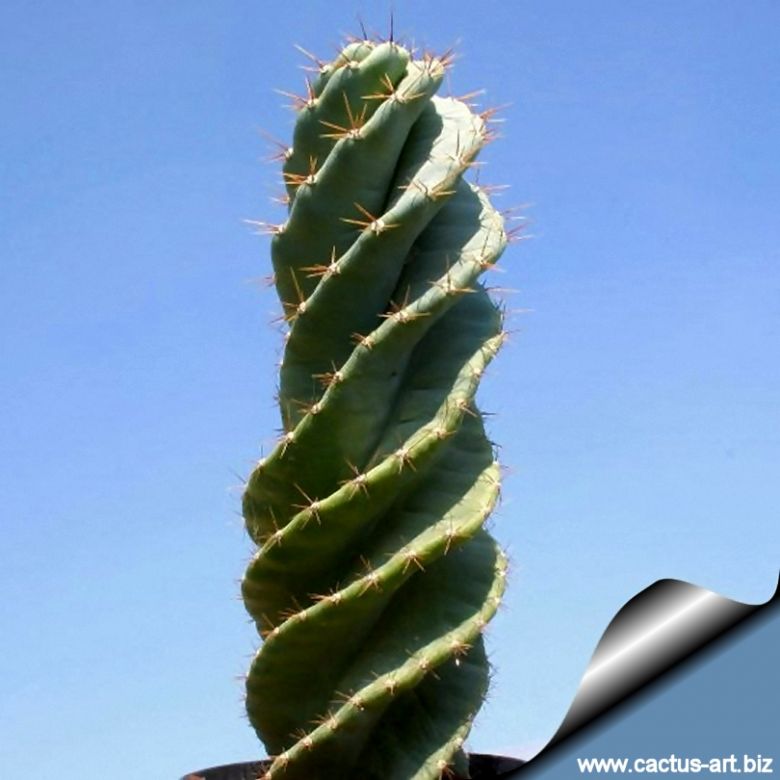
Cereus peruvianus f. spirale (Cereus forbesii cv. Spiralis) Photo by: Cactus Art
A glaucous-green screw in the sky!
Origin and Habitat: Brazil?
Synonyms:
See all synonyms of Cereus hankeanus
back
Accepted name in llifle Database:Cereus hankeanus F.A.C.Weber ex K.Schum.Gesamtbeschr. Kakt. i. 88. 1897Synonymy: 6
Cultivars
(1):
back
Description: The spiral cereus (Cereus forbesii cv. SpiralisSN|11160]] ), is a shrubby or treelike species dubiously thought of as a mutant Cereus forbesiiSN|7058]]SN|7058]]. It is a (usually) trunkless cactus that forms numerous tall, ascending, columnar stems which branch at the base in a candelabra-like arrangement. Stems have a waxy bloom on the surface and reach a height of 2-4 metres (but can grow up to 5 m high or more), and are 10 to 12 cm in diameter. They have five to nine widely-spaced ribs. A few branches from the original plant were imported in Europe around 1980 for a very hight price. The original clone was characterized by strong grey stems covered with a dense pruina coating and with short spines (Also known as "short spined clone"), but nowadays almost all the plant on the trade are seed grown specimens derived from cross pollination with (presumably) Cereus forbesii cv. SpiralisSN|11160]] or Cereus stenogonus, they are usually a darker blue-green colour usually with longer spines, and there remains a considerable confusion surrounding the true identity of this plants.
It is a heavy bloomer and large purple fruits are easily produced when flowers are pollinated. It is self-sterile.
Subspecies, varieties, forms and cultivars of plants belonging to the Cereus validus group
 Cereus forbesii Otto: shrubby or treelike up to 7 m tall. Ribs 4 to 8. Radial spines 2-5, to 2 cm long, centrals 1-3, stouter than the radials. Distribution: Argentina, Bolivia, and Paraguay.
Cereus forbesii Otto: shrubby or treelike up to 7 m tall. Ribs 4 to 8. Radial spines 2-5, to 2 cm long, centrals 1-3, stouter than the radials. Distribution: Argentina, Bolivia, and Paraguay. Cereus forbesii cv. Spiralis: Distribution: Brazil?
Cereus forbesii cv. Spiralis: Distribution: Brazil?
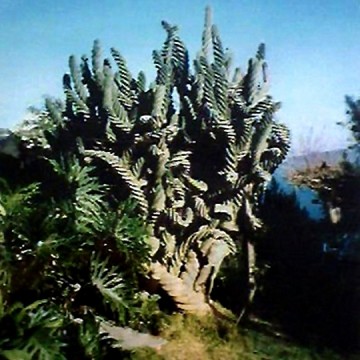 The original plant from Brazil. (Photo of unknown origin from the web) (Cereus forbesii cv. Spiralis) Photo by: Cactus Art
The original plant from Brazil. (Photo of unknown origin from the web) (Cereus forbesii cv. Spiralis) Photo by: Cactus Art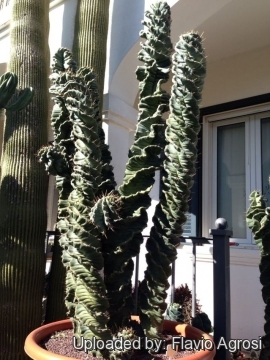 Cereus peruvianus f. spirale (Cereus forbesii cv. Spiralis) Photo by: Flavio Agrosi
Cereus peruvianus f. spirale (Cereus forbesii cv. Spiralis) Photo by: Flavio Agrosi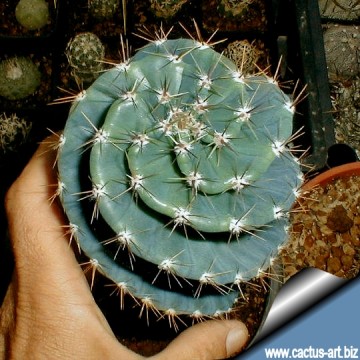 This is a very nice plant. The ribs grow in a spiral (Cereus forbesii cv. Spiralis) Photo by: Cactus Art
This is a very nice plant. The ribs grow in a spiral (Cereus forbesii cv. Spiralis) Photo by: Cactus Art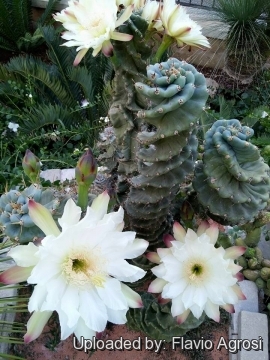 Cereus peruvianus f. spirale (Cereus forbesii cv. Spiralis) Photo by: Flavio Agrosi
Cereus peruvianus f. spirale (Cereus forbesii cv. Spiralis) Photo by: Flavio Agrosi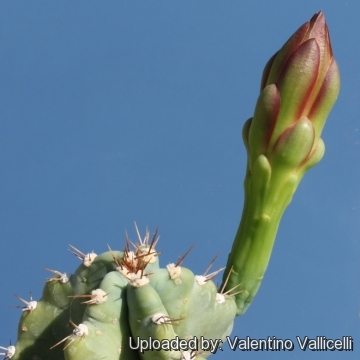 Cereus peruvianus f. spirale (Cereus forbesii cv. Spiralis) Photo by: Valentino Vallicelli
Cereus peruvianus f. spirale (Cereus forbesii cv. Spiralis) Photo by: Valentino Vallicelli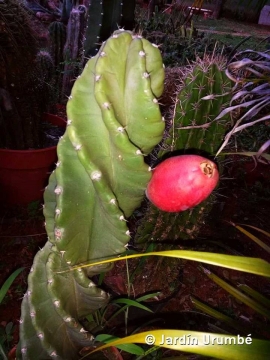 Cereus peruvianus f. spirale (Cereus forbesii cv. Spiralis) Photo by: Alexander Arzberger
Cereus peruvianus f. spirale (Cereus forbesii cv. Spiralis) Photo by: Alexander Arzberger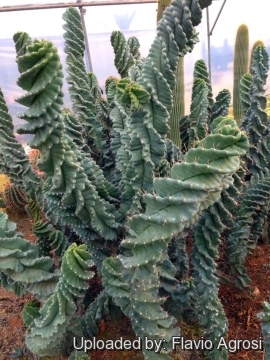 Cereus peruvianus f. spirale (Cereus forbesii cv. Spiralis) Photo by: Flavio Agrosi
Cereus peruvianus f. spirale (Cereus forbesii cv. Spiralis) Photo by: Flavio Agrosi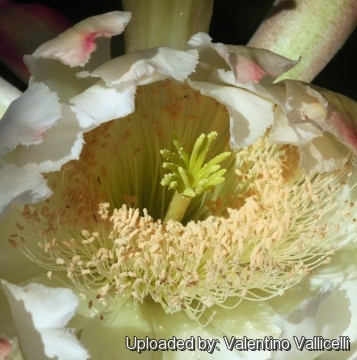 Cereus peruvianus f. spirale (Cereus forbesii cv. Spiralis) Photo by: Valentino Vallicelli
Cereus peruvianus f. spirale (Cereus forbesii cv. Spiralis) Photo by: Valentino VallicelliCultivation and Propagation: They are of easy culture but cold intolerant. Make sure they are not exposed to freezing temperatures ( Hardy to -2°C) or they may die. They need a well drained soil mix. Water regularly in summer but allow to dry fully before watering again. During the winter months they should be rather kept dry. Since they are rapid growers, they need plenty of space for their roots. Repotting should be done every other year, or when the plant has outgrown its pot.
Sun Exposure: Light shade when young, full sun later.
Propagation: From cuttings in spring (let them dry till the ends callous well). Then replant them in fresh cactus soil that is ever so slightly moist, and keep them that way till they root), or by Seeds (Seeds should be sown in a well-drained soil mix. Surface sowing is the best; seeds germinate in 14-28 days at 25° C.
Your Photos
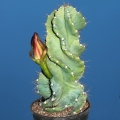
by Valentino Vallicelli
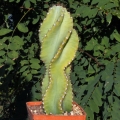
by Valentino Vallicelli
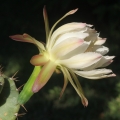
by Valentino Vallicelli

by Valentino Vallicelli

by Cactus Art
























